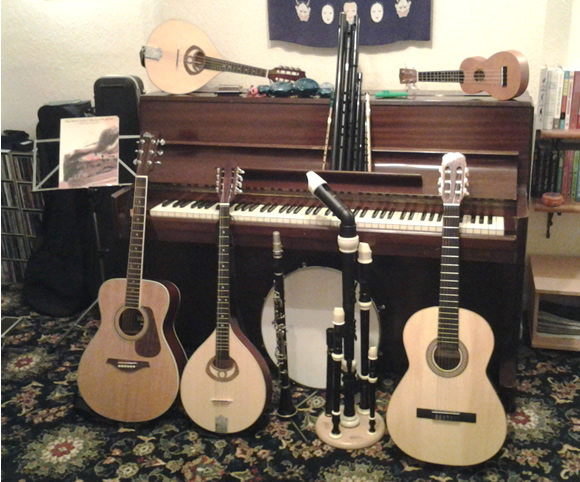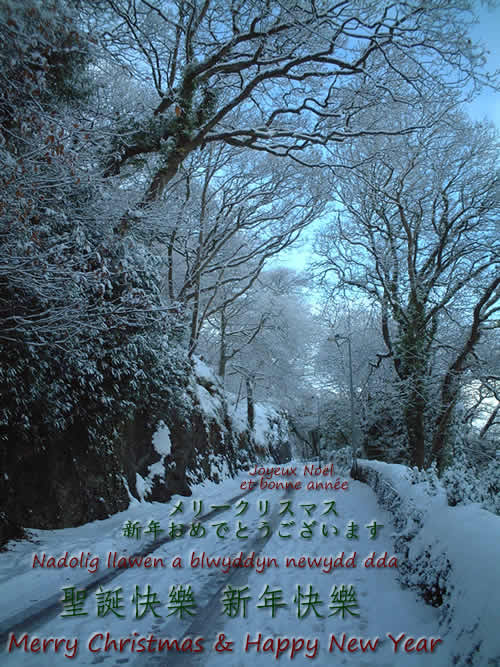– l’appareil auditif/acoustique (m) = hearing aid = teclyn clywed = adskouarn / klevosod
– la piste = track, tracks, trail; lead, course = llwbyr, ôl, trywydd = hent, roudenn
– la piste cyclable = cycle track = llwybr beic = roudenn belo (?)
– bégayer = to stammer = siarad ag atal = gagiñ
– l’accompagnement (m) la garniture = trimmings = trimins = ambroug, gwarnitur
– les nouvelles = news = newyddion = news
– le bulletin d’informations = news broadcast/bulletin = bwletin/darllediad newyddion = lizher kelaouiñ
– la conférence de presse = press/news conference = cynhadledd newyddion = emvod kelaouiñ
– la marine = navy = llynges = marin, mordeadurezh
– une fin heureuse = a happy ending = diwedd hapus = echuiñ eürus (?)
– la noces = wedding = priodas = dimez
– le voyage de noces (voyage), la lune de miel (période) = honeymoon = mis mêl = miz mel
Штурмовщина
Штурмовщина (Šturmovščina / Shturmovshchina) is a useful Russian word I came across in Mark Forsyth’s The Horologicon – A Day’s Jaunt Through the Lost Word of the English Language, which I got for Christmas. It means last-minute rush and refers to the practice of working frantically to fulfill production targets in factories at the end of each month when materials finally arrived, or if they didn’t arrive people used whatever was to hand to produce the required goods. This often resulted in shoddy products and was apparently a common practice in the Soviet Union. Similar practises were common in construction.
The word штурм (šturm) means storm or conquest, and штурмовать (šturmovat’) means to storm or conquer, so штурмовщина is all about storming and conquering those deadlines. It is also defined as “short bursts of extremely intense work after procrastination”, and possibly results from the relatively short growing season in Russia, which meant that most of the agricultural work had to be done quickly and intensively over the summer. The rest of the time the peasants could idle, contemplate and philosophise [source].
More interesting words are discussed in the book, and on the blog Inky Fool.
Do you leave everything to the last minute and then attack it in a fit of shturmovshchina, or are you more organised?
I have been known to leave things until the last minute, though try not to do it too often.
New song – Everyday Adventures
Here’s a song that came to me a few weeks ago and which sounds a bit like it comes from a musical – maybe I should write one 🙂
Everyday Adventures
Wherever you go, whatever you do,
There are adventures waiting round the corner for you.
So open your eyes, your ears and your mind,
And you might be surprised by what you find.
Watch the birds, bees and flowers,
Not the minutes and hours
And take time to think and wander and dream.
Let go your regrets and worries and frets
And let your heart fill with joy.
Here’s a recording:
Resolutions
Happy New Year to you all!
If you make New Year’s resolutions, have you resolved to learn a new language or to learn more of language?
I don’t really make resolutions, but plan to continue my studies of Breton and Russian this year. I don’t know how long it will take me to get to a level I feel comfortable with in each, but once I get there, I may have a go at Swedish or Norwegian, probably using an Assimil course in German, which will help to improve my German as well.
Language quiz
Here’s a recording in a mystery language.
Can you identify the language, and do you know where it’s spoken?
Scripts and alphabets
I tend to use the words script and alphabet fairly interchangeably – I might talk about the Arabic script or the Arabic alphabet, for example. However I just noticed today that Wikipedia has one page on the Cyrillic script, which focuses mainly on the history of the script/alphabet, and separate pages for Cyrillic alphabets as used for particular languages (Russian, Bulgarian, Serbian, etc). The Latin/Roman script is treated in a similar way.
It seems that a script refers to the overall writing system rather than to the particular set of letters used to write a particular language, or alphabet. So you could talk about the Devanagari script, and the Hindi alphabet, i.e. the Devanagari letters used to write Hindi.
Have you come across this distinction before? Do you think it’s a useful one to make?
Selective attention
The other day an English guy who has lived in Wales for many years and who doesn’t speak Welsh told me that when he listens to people speaking Welsh, he hears lots of English words, words derived from English, and words from French or Latin, so he believes that Welsh is made up mainly of such words.
I suggested that such words just seemed to be prominent and ubiquitous because they are the only ones he understands, and that the majority of Welsh words are completely different, though they share the same ultimate roots as words in most other European languages.
He wasn’t convinced, and when asked for examples, could only think of a few: parcio (parking) and ffenestr (window) and pont (bridge).
I can understand why he’s convinced that there are lots of words of English, French and Latin origin in Welsh – selective attention. It’s like if someone says that you don’t see many yellow cars around, you will start to notice ever yellow car and might become convinced that they are more common than they really are.
Have you any mistaken impressions of languages you don’t know?
When I first heard spoken Irish I thought it was mainly made up of the occasional English word, plus lots of agus (and), and mumbling in an Irish accent. Now I know better.
Seasons Greetings!
Fy filodfa gerddorol
Mae’r nifer o offerynnau yn fy filodfa gerddorol wedi cynyddu eleni, ac mae gen i 30 o offerynnau bellach. Yr offeryn mwyaf newydd ydy piano, sy wedi cyrraedd Dydd Gwener diwetha. Piano ail law ydy o, a dw i wedi ei brynnu o eBay o ddyn yn Salford.
Ar hyn bryd mae gen i piano, iwcalili, mandolin, bouzouki, bodhrán, xaphoon, clarinét, casŵ, ffliwt, dau gitâr, dau harmonica, a cryn dipyn o recorderau, chwibanau ac ocarinas.

My musical menagerie has grown quite a bit this year and now includes 30 instruments. The newest addition was a piano, which arrived last Friday. It’s a second hand piano that I bought on eBay from a bloke in Salford.
The menagerie currently consists of: a piano, a ukulele, a mandolin, a bouzouki, a bodhrán, a xaphoon, a clarinet, a kazoo, a flute, two guitars, two harmonicas, and quite a few recorders, whistles and ocarinas.
Language quiz
Here’s a recording in a mystery language.
Can you identify the language, and do you know where it’s spoken?
